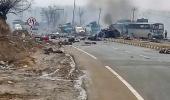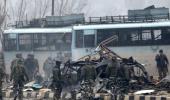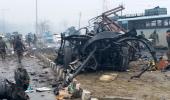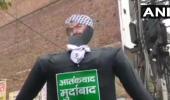'Definitely, they are going to attempt this, not only in Kashmir but elsewhere, maybe in the Jammu area and beyond.'
'They would want to expand the battle space and the conflict area.'
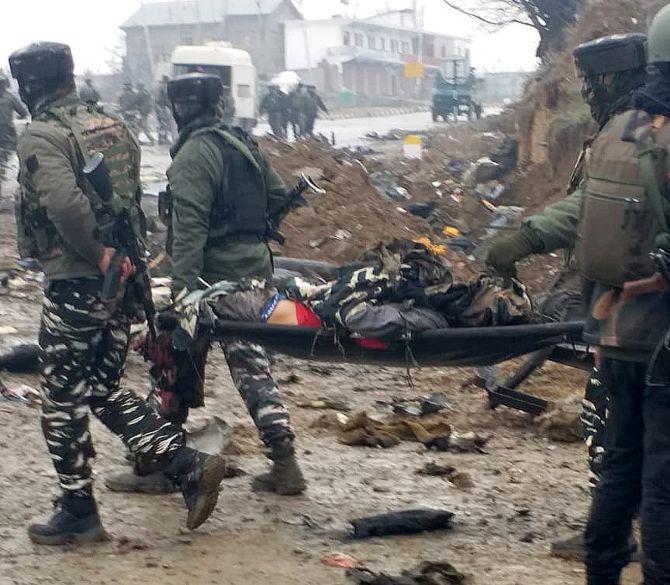
Brigadier Narender Kumar (retd) served nearly a decade in the Kashmir valley. He commanded a Rashtriya Rifles battalion in Jammu and Kashmir which fights terrorism in the state.
Currently, a Distinguished Fellow at the United Services Institution of India, Brigadier Kumar tells Rediff.com's Archana Masih, "Wars are not fought on anger and emotions. Wars are fought on strategy and capability. The response should be at a place and time of your choosing. We must prepare, look at ground realities, hone in on the targets and strike hard."
As an officer who has conducted counter-terror operations in the Kashmir valley, what about the modus operandi of Thursday's attack is most worrying?
This is a war. It is asymmetric and hybrid in nature. The strategy of terror organisations does not remain consistent. When they fail in one strategy, they come up with another to surprise the security apparatus.
They suffered great losses in 2017-2018 at the hands of the security forces; their leadership was wiped out. They had to retaliate to lift sagging morale.
The modus operandi was the use of minimum force for maximum impact.
It is troubling that such large amounts of explosives eluded scrutiny. It must have taken a long time of preparation. What were the lapses?
It takes time to radicalise and prepare someone who is ready to die for jihad.
Secondly, 90% of operations by security forces should be related to intelligence -- which means efforts to gather intelligence should be 90% and the strike back should be 10%.
We have to understand this is a war which has nexus with Pakistan, China, jihadi elements in the Middle East and the disaffected people of Kashmir.
This is not an insurgency.
To decode this nexus, 90% efforts are needed to build up intelligence base. Success is not possible unless you have intelligence about where these terrorists are, what they are eating, where they are sleeping, where they are going.
If a terrorist action is not pre-empted, then how can a safe environment be created?
A detailed intelligence network is needed which includes artificial intelligence. There has to be data mining of social media so that cushions can be developed against such terror strikes.
Can similar attacks be expected in the future?
India is going to face unprecedented attacks in the run up to the elections.
Such an attack was launched after 2004 and it has reaped them great success.
Definitely, they are going to attempt this, not only in Kashmir but elsewhere, maybe in the Jammu area and beyond.
They would want to expand the battle space and the conflict area.
Security forces have eliminated many terrorists. You have written that elimination of terrorists does not mean elimination of terrorism. As someone who led a number of missions in the valley, what do you think needs to be done?
A layered strategy is required. In hybridity of operations, when one tool doesn't succeed, the other tool must.
There is need to harden targets so as to not give exposed flanks. There should be no violation of SOPs (Standard Operating Procedures).
The hallmark of such operations is that intelligence imparts every bit of information that impacts operations.
Thirdly, there has to be deterrence.
The fear of loss of life has to felt by terrorists. When they say they are not scared of death, it is a lie.
I have led many operations where they have begged for their lives.
But more importantly, unarmed jihadis, who assist in providing logistics, have to be brought to book.
There is a debate in India about how to handle these overground workers. Make laws that deter these elements for carrying out these anti-national activities.
They are spewing venom and mobilising youth to become terrorists.
Fourthly, this conflict can't be just resolved by military action.
You say we have been unable to defeat the narrative of jihad in Kashmir.
Perception and psychological warfare, including cyber war, is required.
Most terrorists live in the future. In the hope that one day they will succeed. Therefore, it is important to defeat the idea than defeat the individual.
There were intelligence alerts about IED attacks. Why are such alerts not taken seriously?
Without substantive information, it is not possible to respond to alerts.
When I was commanding the Rashtriya Rifles, terrorists had put (a) Rs 5 lakh (bounty) on my head and on my company commanders.
We knew that, but intelligence could not tell us who and where these terrorists were.
There is a difference between information and intelligence.
If information had been converted into intelligence, the CRPF would not have moved its convoy.
Intelligence has to be accountable and has to adapt technology.
The Indian Army formed a psychological warfare brigade in 2004 even much before the UK. But it was shut down in 2005. The Technical Support Division raised by (then army chief) General V K Singh was shut down.
These retrograde steps will not make us move ahead.
What do you think India's response should be?
Wars are not fought on anger and emotions. Wars are fought on strategy and capability. Governments can come and go, but strategies must be constant.
The response should be at a place and time of your choosing. The national security apparatus can't go into limbo when electioneering takes place because mature democracies don't function like this.
Most importantly, action should not be taken in anger because it has chances of high failure.
We must prepare, look at ground realities, hone in on the targets and strike hard.
That would be the use of hard power?
India has to use soft power too. Pakistan is in a precarious economic situation. India should use diplomatic power to press the international community to not support a terrorist State financially.
Sun Tzu says if a leader is sensitive to provocation, he is likely to lose the war. You should not be like a wave that fades away after hitting the shore.
You should be like the tsunami which takes off from the deepest part of the ocean and strikes so hard that nothing can stop it.
How can the problem of homegrown terrorists be dealt with?
Post the killing of Burhan Wani, social media has created homegrown terrorists of disaffected youth.
This threat will spill over to the rest of the country.
There is disaffection with the State, above that there is homegrown terror which is more potent and lethal.
You write about the government's inability to morally exclude these terrorists.
It took the ideology took almost 100 years to convince the Islamic world that the idea of the Caliphate is not dead after the Ottoman empire. That ideology can't be rolled back in 5 to 10 years.
Moral exclusion starts when changes are made in education and social organisations which are responsive. When democratic structures are created that do not thrive on communal and religious bias, when moderate and nationalistic leaders debate with hardliners.
A concentrated strategy has to be adopted to defeat this idea and it will take a long time.
